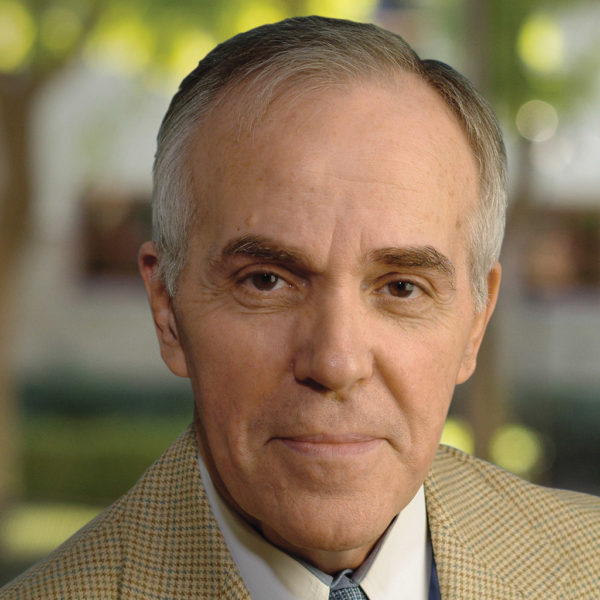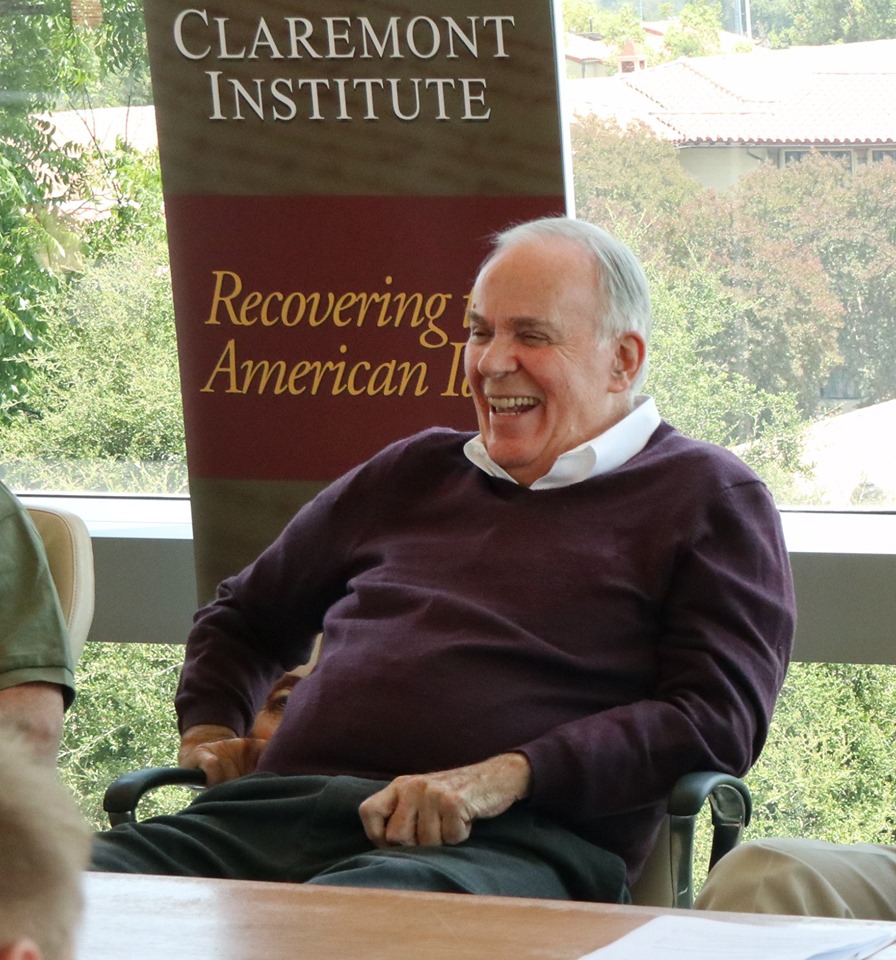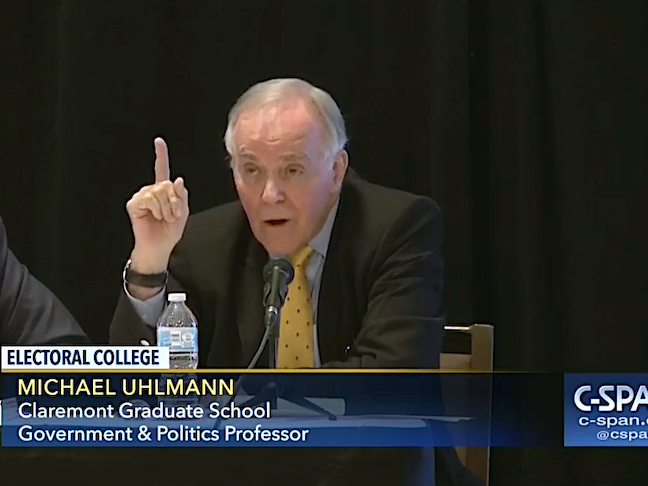Michael M. Uhlmann, a devoted son of the Church, a great American, and dear friend to many, died on October 8 in Newport Beach, California.
Readers may recall his essays in The Catholic Thing, First Things, or The Claremont Review of Books. Few know much about the man, however, because he was different from most people who have spent much of their time living and working in Washington. He preferred discussing philosophical and theological ideas and public policies than talking about – or promoting – himself. But when so much in the Church and the world seems discouraging, his is a life-story worth telling.
He was born at Georgetown University Hospital and attended a Catholic grammar school, ironically named after the man he would revere later in life, St. Thomas More. Thanks to a generous benefactor, P.R. Mallory (the founder of what became the battery company, Duracell), Mike was able to complete his high school education at The Hill School in Pottstown, Pennsylvania, during the reign of the legendary headmaster, Edward T. Hall.
He went from there to Yale University in 1958 on an academic scholarship, developed an interest in politics, and was present at the birth of the modern conservative movement.
Over a weekend in September 1960, Mike attended an organizational meeting of the Young Americans for Freedom (YAF) at “Great Elm,” the home of William F. Buckley Jr. in Sharon, Connecticut. He was one of the authors of YAF’s founding declaration of Conservative principles, which became known as “The Sharon Statement.”

After Yale, he went off to the University of Virginia Law School, where he received his LL.B. in 1966. One law professor Mike had impressed sent him to present his paper in his place at the Philadelphia Society conference in Chicago. At that meeting, Mike was captivated by another attendee, the renowned political philosopher, Harry Jaffa.
That encounter convinced him to travel west to study under Jaffa and his even more famous colleague, Leo Strauss, at Claremont University.
As an Earhart Fellow, Ford Foundation Fellow, and Henry Salvatori Research Fellow, Mike earned his Ph.D. in government, writing his thesis on the merits of the electoral college.
From Professor Jaffa, who became a close friend, Mike learned that “the great principles of right and wrong must govern the people, if the people are to be able to govern themselves. . . .[That] no majority, however great, can authorize what is intrinsically immoral.”
For the remainder of his life, Mike would promote policies based on those principles in the public square – particularly when it came to abortion. He moved back to Washington when he was hired as Chief Republican Counsel to several Senate committees and as a legislative aide to Senator Roman Hruska of Nebraska.
When the House of Representatives passed legislation in 1970 to abolish the Electoral College in favor of direct election of the president, Mike wrote the dissenting minority report for the Senate Judiciary Committee that convinced a majority of U.S. Senators, including Senator Eugene McCarthy, to reject the House bill.
In 1971, he became Legislative Counsel for Senator James Buckley of New York. In that role, he drafted the Human Life Amendment, which was introduced by Senator Buckley, after the Supreme Court handed down Roe v. Wade.
The 96-year-old Buckley remarked last week, “Mike Uhlmann was a soft-spoken man of deep intelligence, one who combined a lovely sense of humor with an iron adherence to thought-through principle. His in-depth understanding of the Constitution and its philosophical and political roots were of enormous help to me when he was a member of my Senate staff and the lessons he taught me served me well in my later role as a federal appellate judge.”
Called upon to head up the Justice Department transition by President Ford, Mike was subsequently appointed Assistant Attorney General for Legislative Affairs. It was during the Ford Administration that Mike also befriended the Assistant Attorney General for the Office of Legal Counsel, Antonin Scalia.

After Jimmy Carter took office in January 1977, he became president of the National Legal Center for the Public Interest, a non-profit consortium of legal foundations “litigating in the name of free enterprise and limited government.”
During his tenure, he told a New York Times columnist that leftists “don’t have exclusive claim on the use of the term ‘public interest.’” He added that Liberals behave, “just like the monopolists when someone enters some competitive ideas.”
Ronald Reagan summoned Mike back to public service in 1980-1981, first as Director of the Legal Administrative Policy Office of the Presidential Transition and Policy Director of the Department of Justice Transition Team, and then as Special Assistant to the President, Executive Secretary to the Cabinet for Legal Policy, and Associate Director of the White House Office of Policy Development.
One clash Mike had with the “pragmatists” around Reagan concerned abortion. After President Reagan completed writing, with Mike’s assistance, a lengthy essay titled “Abortion and the Conscience of the Nation,” many White House aides opposed publication. Mike convinced the president otherwise and it appeared first in The Human Life Review and later in hardcover and paperback editions.
In that work, Reagan declared “My administration is dedicated to the preservation of America as a free land, and there is no cause more important for preserving that freedom than affirming the transcendent right to life of all human beings, the right without which no other rights have any meaning.”
By 1985, Mike, the father of five children, faced ever-growing tuition bills and other family expenses. Hence, he decided to leave the Reagan Administration to become a partner in the Pepper Hamilton law firm.
Shortly after George H.W. Bush was sworn in as president in 1989, White House counsel C. Boyden Gray, told Mike that Bush wanted to nominate him to the U.S. Court of Appeals for the D.C. circuit.

He declined for two reasons. The first was a troubling comment Senator Joe Biden – then Chairman of the Judiciary Committee – made to him during a chance meeting: “I hear the president is sending down your name and I can’t wait to subpoena all your White House memos from the Reagan years.” He was rightly concerned that this might lead to another spectacle: his being “Borked” by Senate Democrats because he was very publicly pro-life. (Mike was a founding board member of The Human Life Foundation, which publishes The Human Life Review.)
The second reason was family concerns, particularly financial ones that, as the father of five children, were considerable. Gray tried to convince him anyway, but Mike recommended that, in his stead, the resident nominate Clarence Thomas. Justice Thomas has remarked that “if it were not for Mike Uhlmann, I wouldn’t be on the Supreme Court.”
As a consolation prize, President Bush appointed Mike the Public Member of the Administrative Conference of the U.S.
In 1994, Mike joined the Ethics and Public Policy Center as a Senior Fellow. During that four-year stint, Eerdmans’ Press published Mike’s 600-page Last Rights: Assisted Suicide and Euthanasia Debated, a book that examines moral, theological, medical, and legal perspectives on the subject.
In 1998, Mike Joyce, President of the Lynde and Harry Bradley Foundation in Milwaukee, convinced Mike to leave Washington and become his Senior Vice President.
Mike found his true calling in 2002, however, when he became a Professor of Government at Claremont Graduate University and Claremont-McKenna College. For seventeen years, he mentored dozens of students including Senator Tom Cotton of Arkansas. His student evaluations consistently placed him among the very best of the faculty.
One of his former students says that no man influenced his thinking more, that he revered him and looked to him as a surrogate father. Another student remarked that thanks to Mike’s example and guidance, he converted to Catholicism.
Not a bad legacy. And there were many similar cases.
Many will remember Mike as a political sage and constitutional scholar or for his most famous quip, known as Uhlmann’s Razor, “When stupidity seems a sufficient explanation, there is no need for recourse to any more elaborate analysis.”
But we will always remember our devoted friend Michael as a Compleat Catholic Gentlemen, a vigorous proponent of the good in public life – but like his hero Thomas More, God’s servant first.
Michael Martin Uhlmann, Requiescat in pace.















